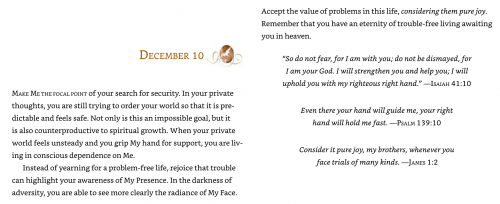| Fruit of Our Labor Thursday, December 10, 2020 When we are engaged in some form of contemplative practice, we are more able to bring Christ into the world. By emptying ourselves, we are more able to embody God’s presence for others. Professor and Episcopal priest Vincent Pizzuto writes about how contemplation enables this to happen:The contemplative disciple is one who is clothed with love. . . . One meditates, then, not in order to produce a successful meditation but in order to be transformed into an ever more compassionate person. We pray not that we might become mystics but that we might become ever more authentic Christians who embody the love of Christ in the world.John of the Cross [1542–1591] takes up the analogy of a smudgy window to make the connection between deification [becoming more like God] and contemplative discipleship. A smudgy window, he says, is less able to transmit the sunlight shining through it. The more cleaned and polished the window, the more identical it appears with the rays of sunshine. While the nature of the window is distinct from the sun’s ray, a clean window better participates in the ray of sunlight that passes through it. As one progresses in the spiritual life it is as if the window all but disappears, allowing the Christ light to shine through it without hindrance. [1] . . .It is not mystical experience we are after but radical interior transformation, so that others may experience Christ more fully in us. [2]The contemplative mystic John of the Cross frequently wrote about the via negativa, or the path of darkness as a way to greater union with God. Spiritual teacher Beverly Lanzetta explores the darkness as a pregnant place from which one “gives birth” to the Divine in the world. She calls it “a theology of gestation.” She writes:From darkness and uncertainty, it waits for the Divine to be born in its own time. The process doesn’t try to contain new revelation in the dry, crusty soil of old forms, but germinates each seed in the moist openness of heart, fertile and hollow like the womb, receptive and waiting. It is the qualities of Wisdom, the Mother of all—merciful, gentle, humble, nondual, holistic, benevolent—that we tenderly bear. Verdant, womb-like theology welcomes new seeds to take root. Round and hollow in imitation of divine fecundity, gestation cannot be forced; new life cannot be prescribed. We cannot change the color of the eyes, or the shape of the nose. Similarly, we cannot fashion divine self-disclosure to our own liking. Impregnated with its seed, we simply support it and watch it grow. [3]Richard again: Regardless of our gender, the fruit of our labor is a gift from God for the world. What else could we want this time of year? |
